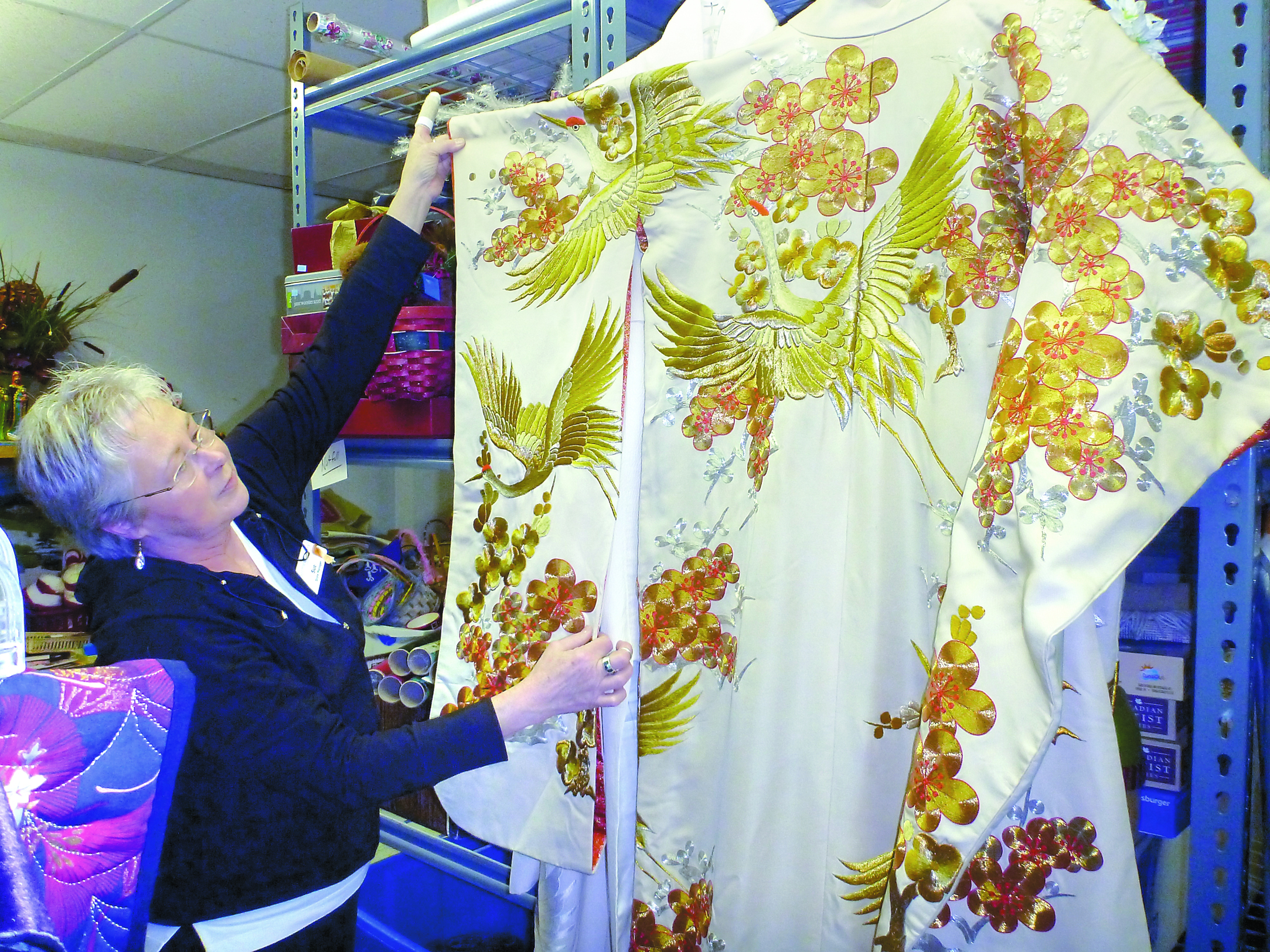PORT TOWNSEND — Thirty years ago, Fred and Helen Grabos were invited to a wedding in Japan.
The couple, who lived in Japan in the 1970s, had introduced the bride to her future husband. The wedding invitation included airfare, food and lodging.
Before the Graboses returned to Seattle, the bride’s family presented them with a gift — the kimono worn by the bride.
That kimono, along with more than a dozen others, is changing hands this week at the Children’s Hospital Thrift Store’s annual Asian Days Sale.
The Asian Days Sale is today through Saturday, April 21, from 9:30 a.m. to 5:30 p.m. at the Children’s Hospital Thrift Store, 2120 W. Sims Way, Port Townsend.
Most items for the sale came in during the past two months in response to an email.
But the wedding kimono, as it was the first time it was given, came a surprise.
“I walked in there Sunday before last and asked them if they took donations,” said Jeannette Hall of Quilcene.
“Bringing in the kimono from the car, I said, ‘You guys know this has a little bit of a story.’”
Hall is the daughter of Fred Grabos, who now lives in Port Townsend. Her mother, Helen, died in 1998.
A toolmaker for Boeing, Hall’s father had signed up for a two-year stint in Japan in 1978, Hall said. He was working with Fuji Heavy Industries, a Boeing subcontractor, in Utsunomiya, 50 miles north of Tokyo.
The job turned out to last longer than two years, Hall said.But her parents loved the city. Helen also was in demand as an English conversation teacher.
She developed a circle of students of all ages and from all walks of life, Hall said.
They included a young woman who happened to be studying with Helen the day Fred brought home a Japanese friend from work.
The meeting led to an engagement, and as matchmakers, Fred and Helen were guests of honor at the wedding.
“My mother gave a speech in Japanese,” Hall said. “My dad still has a tape of it.”
Her father also has a photograph of the wedding party, which consisted of two dozen people, Fred and Helen being the only two Americans.
The ceremony was a huge affair, with the bride changing clothes several times.
Back in Seattle, her parents displayed the kimono on the wall of their condo, which had high ceilings.
It traveled with Hall, her husband and her father when they all moved to Arizona, and came back with them when they returned to the Northwest.
Not wanting to sell it on consignment or eBay, Hall decided to see whether the Port Townsend thrift store, which supports Children’s Hospital and Medical Center in Seattle, would take it.
“My dad likes to contribute,” she said.
Thirteen other kimonos, plus undergarments and obi (sashes), are also in the sale, donated by Mike and Kathy Bare of Sequim.
Last year, the Bares gave 44 kimonos and jackets from the collection of Mike’s first wife, Kiyoko, who died in 2002.
The sale drew people from across the Olympic Peninsula, who were lined up at the door when the store opened at 9:30 a.m.
Another unexpected gift arrived from the estate of the late Marty Woodard of Port Townsend.
Woodard, who was 55, died of a heart attack in January while at work at a lumber mill in Snohomish.
His uncle, Ben Noble, was in charge of the estate and decided to donate the contents of the house and yard to the store, manager Sue Garlinghouse said.
“He was a patient at Children’s Hospital when it was on Queen Ann Hill,” Garlinghouse said.
The estate items include a large statue of an Indian goddess and wooden table lamps shaped like pagodas.
Although it’s not part of the Asian Days Sale, a hand-tinted photograph by Asahel Curtis was also yielded by the estate. It is being professionally appraised in New York, Garlinghouse said.
Other items were donated in response to an email that went out, asking people to check closets and attics for items of Asian make or design.
They include an oak Japanese writing desk, a bone and bamboo Mahjong set and a black lacquered box with inlaid lid.
Garlinghouse, who is an artist, will use the desk to demonstrate sumi painting,which she learned as a child from a relative.
The stand-out of this year’s donations from the Bares is a white-on-white kimono, embroidered with cranes, that Kiyoko used to wear to New Year’s Eve parties.
The wedding kimono that Hall’s parents received as a gift is also embroidered with cranes, a symbol of fidelity, good fortune and love.
________
Jennifer Jackson is a freelance writer and photographer living in Port Townsend. To contact her, email jjackson@olypen.com.

